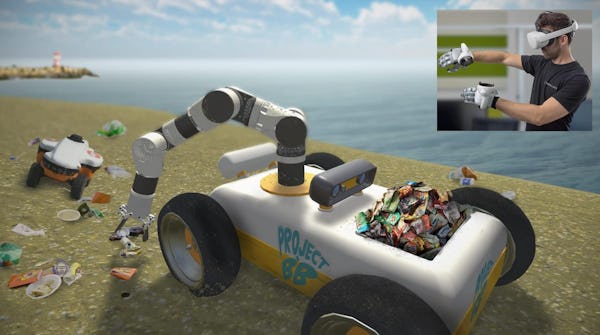BeachBot, or BB for short, started life as a project developed at a hackathon. TechTics founders Martijn Lukaart and Edwin Bos, with help from students from Delft University of Technology near Rotterdam in The Netherlands and everyday beach goers, utilised Microsoft’s Trove technology that connected AI developers with imagery to teach an autonomous robot with a detection algorithm to recognise cigarette butts and other items as litter for removal.
As the most commonly littered item in the world, it’s estimated there are around 4.5 trillion cigarette butts polluting waterways, beaches and outdoor spaces. A study of American college student smokers found that over half of participants littered their cigarette butt outside without understanding that the butt doesn’t biodegrade.
A littered cigarette butt contains fibres including acetate that in a marine environment releases harmful chemicals and creates particles that can collect toxins. These fragments and their accumulated toxins can then be consumed by wildlife and subsequently enter the food chain, where they could potentially also harm humans in the long run.
During testing on Dutch beaches, bystanders could help train BB by playing a game to indicate what was and wasn’t waste. Once a piece of rubbish like a cigarette butt was recognised via cameras mounted onboard, the robot’s arm was lowered to push sand on either side of the item until it was safely gripped between two plates, removed, and placed into an internal bin for manual removal later.
Although the robot isn’t particularly fast at removing rubbish and cigarette butts, the inventors are unfazed. TechTics technicians are more interested in the robot’s ability to engage the community and influence people’s perceptions and behaviour around what constitutes litter.
Helping individuals see discarded butts as rubbish follows the American study’s findings that suggested changing students’ perception to view cigarette butts negatively and as litter were the highest predictors in impacting behaviour at the source.
With BB’s latest enhancements, Bos and Lukaart are hoping to spread its litter fighting influence even more broadly. Upgrades have included the addition of a gripper arm with 5G connection enabling the transmission of live images into a Virtual Reality platform, allowing the clean-up of litter to be directed from remote locations. They are also working with the creators of SenseGlove, a Delft-based company developing a glove that enables users to feel the size, stiffness and resistance of objects virtually.

Connecting BeachBot with SenseGlove will enables users to feel litter virtually. (Image source TechTics)
It is creative applications of technology like BeachBot that can help educate and raise awareness in a unique way to help users come to grips with the wide-ranging impacts of litter in our natural environment.
Planet Ark does not take responsibility for the accuracy of the original information and encourages readers to check the references before using this information for their own purposes